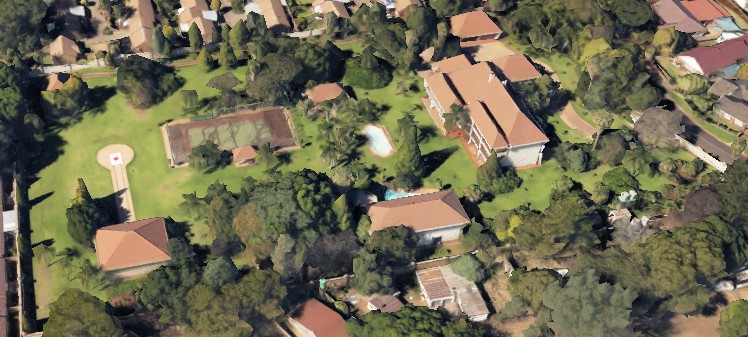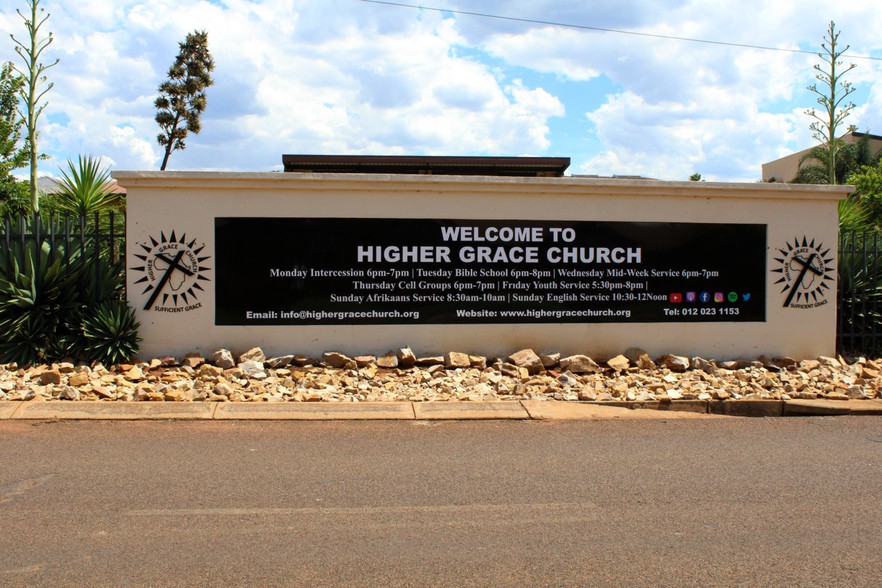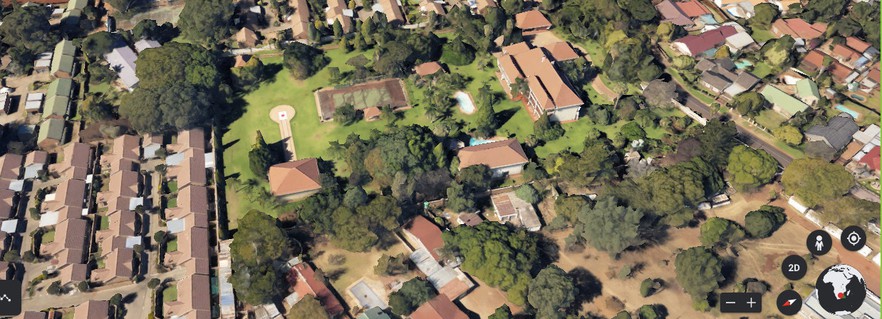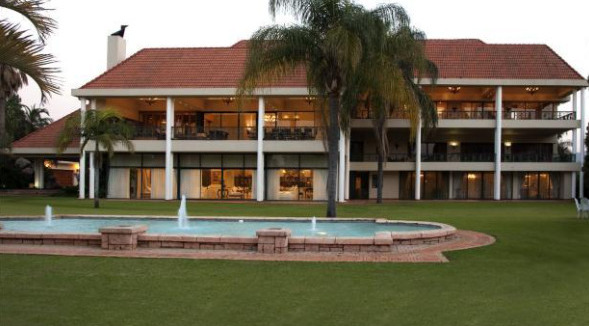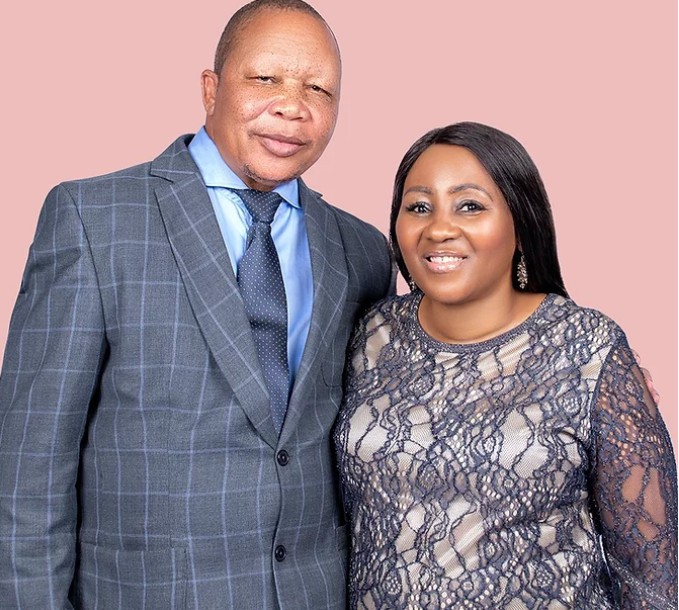Lottery money funded the board chair’s luxury private estate
One of Alfred Nevhutanda’s companies received millions for his mansion from Lottery grants
This photo, from Google Earth, shows former Lottery chairperson’s Alfred Nevhutanda’s estate in the north of Pretoria. (Copied for fair use.)
Non-profit organisations that received Lottery grants contributed millions of rands, directly and indirectly, to help pay for a lavish R27-million mansion for former National Lotteries Commission (NLC) board chairperson Alfred Nevhutanda.
The mansion, on a private suburban estate in Annlin, Pretoria North, is owned by a company of which Nevhutanda is the sole director.
The home is situated on a lavish, sprawling two-hectare — 20,000m² — estate that was marketed for sale by a London estate agent for £2.42 million at the time Nevhutanda bought it in 2018.
Nevhutanda is a director of at least 40 companies, including some involved in mining, investment and communications. He is also the senior pastor at Higher Grace Church International. His wife, Tshilidzi, is also a pastor in the church. The church is a three-minute walk from their home.
Nevhutanda’s church is a short walk from his luxury estate. Photo: Masego Mafata
One of his companies, Vhutanda Investment (Pty) Ltd, is the registered owner of the luxury estate.
A months-long GroundUp investigation has uncovered evidence that R27-million was paid over a six-month period, between September 2017 and March 2018, directly to Couzyn Hertzog & Horak Attorneys, a law firm acting for the seller of the property. This money was held in trust by the attorneys until the property was transferred to Vhutanda.
The total cost of the house, including over R3-million in transfer duties, was more than R30.2-million. Yet it has a municipal valuation of only R5.3-million.
But, at a building cost of at least R15,000 per square metre for high-end homes, the house would have a replacement value of R48-million or more.
The politically-connected Nevhutanda, who is a former provincial chairperson of the ANC in Limpopo, was the chair of the NLC board at the time of these payments and the purchase of the house and estate. He was one of the key fundraisers for the ANC’s 2009 election campaign in Limpopo.
He appears not to have reported any potential conflicts of interest relating to the payments in the 2017-18 financial year when the payments for the house were made to the lawyers.
The estate was purchased on 6 March 2018. It was registered in the name of Vhutanda Investments on 23 May 2018.
Nevhutanda uses the title of professor. This was awarded to him by Azerbaijan’s International Eco Energy Academy for a paper he delivered at an international energy conference. But in 2012, AmaBhungane reported that there were “strong indications of plagiarised material” in the paper he had delivered at the annual international energy congress in Baku, Azerbaijan, bringing into question his professorship.
Nevhutanda did not respond to detailed questions sent to him by GroundUp via email and WhatsApp.
NLC spokesperson Ndivhuho Mafela refused to answer our questions because of an ongoing investigation into Lottery grants by the Special Investigating Unit.
Living in the lap of luxury
Nevhutanda’s house is like a private country estate in the middle of a residential area and dwarfs the surrounding, much smaller properties, as can be seen in this Google Earth satellite image:
Copied for fair use from Google Earth.
The estate was developed by a Pretoria multimillionaire entrepreneur and was listed as being for sale by London-based global estate agents Savills, as part of their “Pretoria Luxury Collection, the leading portfolio of luxury properties”.
Described in the for sale advert as “a hidden gem in the midst of the hustle and bustle of Northern Pretoria”, the original listing included photos of the lavish home and its private helipad.
“This spectacular property needs to be experienced first hand to truly appreciate its timeless charm and prestigious beauty,” Savills said in its advert. “Almost every room leads out to its own balcony enabling you to relax and enjoy the luscious gardens and serene environment with breathtaking views.”
Situated on the two-hectare private estate is the three-storey, 3,200m² main house. It has six en-suite bedrooms with walk-in dressing rooms and private lounges, a double-storey pool house and a private helipad. There is also a five bedroom “servant’s quarter”, according to the advert.
This photo of the house is from an estate agent’s advert. You can see Nevhutanda deliver a sermon from the balcony of the house in this YouTube video. (Copied for fair use.)
The third-floor master bedroom covers an area of 460m² and has a private lounge, a study and a dressing room. The average three-bedroom house in South Africa covers an area of between 110m² and 120m².
The house also has an “executive lounge on the second level that is equipped with a sushi counter, bar and kitchenette and can accommodate up to 130 guests”.
It also has “exceptionally high standards of workmanship” that are “evident in the superior re fixtures and fittings inclusive of marble flooring, solid cherry wood and underfloor heating.”
Facilities on the estate include a tennis court, heated pool, sauna and steam and spa baths. There is also a guardhouse and the entire property is surrounded by a 3m high electrified perimeter wall.
SIU investigates house purchase
The purchase of the property was mentioned by SIU head Advocate Andy Mothibi in a presentation on his unit’s investigation into Lottery corruption to Parliament’s Trade, Industry and Competition Portfolio Committee earlier this month. He revealed a trail of fraud, money laundering and networks of corruption.
Mothibi listed several of the house payments and explained to MPs how SIU forensic analysts had tracked the flow of money from non-profit organisations that had received grants from the NLC.
He did not mention Nevhutanda by name. Instead he referred to him as “board member number 2”. He explained how money from non-profit companies that had received lottery grants were paid to the attorneys handling the purchase of the property but did not identify the companies involved.
GroundUp has now identified millions in payments for the house from non-profit organisations that got Lottery grants, as well as several businesses, one of which is linked to Phillemon Letwaba, the NLC’s chief operating officer.
Again not naming Nevhutanda, Mothibi told MPs that “board member number 2” had allegedly received R1-million from a company owned by the brother of a very senior NLC official for the deposit on a luxury vehicle. He was referring to Upbrand Properties and its one-time director Joe Letwaba, the older brother of Phillemon Letwaba.
Mothibi told MPs: “It is clear that the company [Upbrand] belonging to the brother of one senior NLC official [Phillemon Letwaba] was used as a vehicle to launder money received by non-profit organisations from the NLC.”
Following the money
Our investigation has identified many of the payments made directly to Couzyn Hertzog & Horak Attorneys, which were then used to pay for the house.
They include several payments totalling R9.2-million from Mishone Trading 11, a close corporation, headed up by Matodzi Mashele. The SIU presentation said that a non-profit organisation that received R20-million from the NLC sent R11.7-million to Mishone, which subsequently paid R9.2-million to Couzyn Hertzog & Horak Attorneys’ trust account for Nevhutanda’s home.
Mishone Trading 11 has been identified by the SIU as a “vehicle to distribute NLC funds” to businesses “directed by” members of NLC COO Letwaba’s family. Evidence supporting this was presented by the SIU during Letwaba’s recent disciplinary hearing.
GroundUp previously reported how Mashele used WAR RnA, a hijacked non-profit organisation, to successfully apply for R28.3-million, paid out between 2017 and 2018, to build an old age home in North West. Like the other five NLC-funded old age homes, this home is yet to be completed.
Matodzi did not respond to emailed questions sent twice to an address she had previously used to respond to GroundUp.
Couzyn Hertzog & Horak Attorneys, the previous owner’s attorneys, also received in trust R4-million for Nevhutanda’s home from Mushumo Ushava Zwanda, a hijacked non-profit organisation which received R27.4 million to build an old age home in rural Limpopo.
Despite the millions pumped into the project between 2017 and 2018, construction has been abandoned and the half-built, roofless buildings have been left to rot.
When the legitimate members of the organisation found out it had been hijacked and used to apply successfully for NLC funding, they reported this to the NLC. However, instead of reporting the matter to the police, the NLC arranged a meeting between the legitimate members and the hijackers “to try and resolve the issues amicably”, Mothibi said.
“Instead of opening a criminal case against the hijackers and recovering the money, the NLC opted to grant further funding of R7,829,353 to the legitimate members,” Mothibi told MPs.
No additional construction work appears to have been done with the additional funding, Limpopo Mirror and GroundUp found on visits to the site.
Leonard Sidimela, who previously dealt with queries about Mushumo, did not respond to questions about the payment sent to him by Limpopo Mirror, which has been collaborating with GroundUp on Lottery stories.
Another R600,000 came from the Simingaye Community Project, which received a R13-million grant in the 2018-9 financial year.
Nyiko Baloyi, a director of Simingaye, did not respond to questions sent via SMS to two different phone numbers registered in his name.
Then there is R1-million from Zibsilor, a non-profit company that received over R29.5-million to build a drug rehabilitation centre in Soshanguve, near Pretoria. Construction of the centre has ground to a halt and the site appears to have been abandoned.
Another R2.5-million came from Unicus Solu(IT)ons, a company headed up by Jabulani Sibanda. Sibanda was one of the people who were subject to a recent preservation order granted in connection with a multimillion-rand project to build an athletics track in Kimberley.
As previously reported, non-profit organisation Inqaba Yokulinda transferred R10-million of its NLC grant to Unicus under pressure from Sibanda. Unicus subsequently paid R2.5-million to the attorneys acting in the sale of Nevhutanda’s house.
Several cars belonging to Sibanda and his partner that were allegedly bought with money meant for the track were included in the court order. Sibanda did not respond to questions sent to him by email.
Several payments totalling R2.35-million came from Redtaq, a company associated with NLC chief operating officer Letwaba. Letwaba’s brother, Thabo, his first cousin Karabo Sithole, and Keneilwe Maboa, the wife of another of Letwaba’s cousins, were all previously directors of Redtaq. Sithole, who was the director of Redtaq at the time of the payments, did not respond to questions sent to him via WhatsApp.
Payments were also received from several companies, including consulting engineers and a construction company. It is unclear what their relationship, if any, is to NLC-funded projects.
A senior official in the Higher Grace International Church also received major NLC grants while Nevhutanda was chairperson.
Rudzani Nemaungani, a pastor who is active in Higher Grace International, is the director of a non-profit company that was awarded over R20-million for an “initiation programme” in the 2017-18 year. GroundUp has been unable to establish any details about this project. An application requesting information in terms of the Promotion of Access to Information Act (PAIA) in 2018 was refused by the NLC on the grounds that it was bound by law to protect the privacy of its grant recipients.
Responding to questions sent via WhatsApp, Nemaungani denied that Nevhutanda was aware that her company had applied for and had been awarded a grant by the NLC.
“I did it [the application] with my friends and Mr Nevhutanda was not involved. We submitted all the required reports. That’s all,” she said.
Politically connected
Nevhutanda was appointed to the NLC board in 2009, under the Presidency of Jacob Zuma. As former provincial chairperson of the ANC in Limpopo, Nevhutanda was one of the key fundraisers for the party’s 2009 election campaign in that province.
Two years into his term, he was embroiled in a controversy after it was revealed that Makhaya Arts and Culture, which employed his daughter, had received R41-million in Lottery funding. Nevhutanda denied at the time that this constituted a conflict of interest as his daughter had only begun working for Makhaya Arts and Culture after it had applied for funding.
This photo of Alfred and Tshilidzi Nevhutanda is from their church’s website. (Copied for fair use.)
Nevhutanda’s term was supposed to end in 2014 but then-Minister of Trade of Industry Rob Davies extended Nevhutanda’s term by two years.
Before Nevhutanda was re-appointed for a second term in 2017, Dean Macpherson, the DA’s shadow minister for trade and industry opposed it on the basis that he had a “well-documented, scandal-ridden history”.
This “scandal-ridden history” included a R1-million NLC grant in 2011 to COSATU for its birthday bash and a R40-million grant to help pay for the National Youth Development Agency’s 2010 World Festival of Youth and Students. The festival received over R100-million in funding, including grants from the Presidency and from four premiers’ offices. Opposition leaders described the festival as a waste of money.
As chairperson of the NLC board, Nevhutanda was the face of the organisation and maintained an office at the NLC’s Pretoria offices. He often acted as if he was an executive chair and at times was hands-on involved in operational issues.
Staff at the NLC have told GroundUp that Nevhutanda kept a tight grip, controlling the message from the organisation.
Under his chairmanship, the NLC enjoyed heavy political protection. Nowhere was this more obvious than when the NLC appeared before Parliament’s Trade and Industry portfolio committee. Nevhutanda used parliamentary privilege to launch ad hominem attacks on GroundUp and this reporter. The ANC members of the committee also regularly rallied to defend the NLC.
On at least two separate occasions he claimed in Parliament that there was a ”conspiracy” in which someone “stole” information from the NLC, which was being sold to fund a “smear campaign” against the Commission.
He claimed that the NLC had “learned” that the NLC’s computers had been hacked and “information about projects since 2001 was in the US, with a backup in the Western Cape”. This, he said, was the source of media reports about his organisation. And, he said, journalists were being paid to write “fake stories” about misspending by the NLC, with the intention of bringing down the organisation.
“There has been a lot of talk, of course from one source [this reporter], one media [GroundUp] that spoke much about proactive funding.”
He also told MPs that he had called in the State Security Agency (SSA) to investigate.
Nevhutanda resisted several calls from opposition MPs to resign in the face of increasing revelations of corruption by GroundUp. His 11-year tenure as chairperson of the NLC board finally ended in November 2020.
Support independent journalism
Donate using Payfast

Don't miss out on the latest news
We respect your privacy, and promise we won't spam you.
© 2022 GroundUp. This article is licensed under a Creative Commons Attribution-NoDerivatives 4.0 International License.
You may republish this article, so long as you credit the authors and GroundUp, and do not change the text. Please include a link back to the original article.
We put an invisible pixel in the article so that we can count traffic to republishers. All analytics tools are solely on our servers. We do not give our logs to any third party. Logs are deleted after two weeks. We do not use any IP address identifying information except to count regional traffic. We are solely interested in counting hits, not tracking users. If you republish, please do not delete the invisible pixel.

